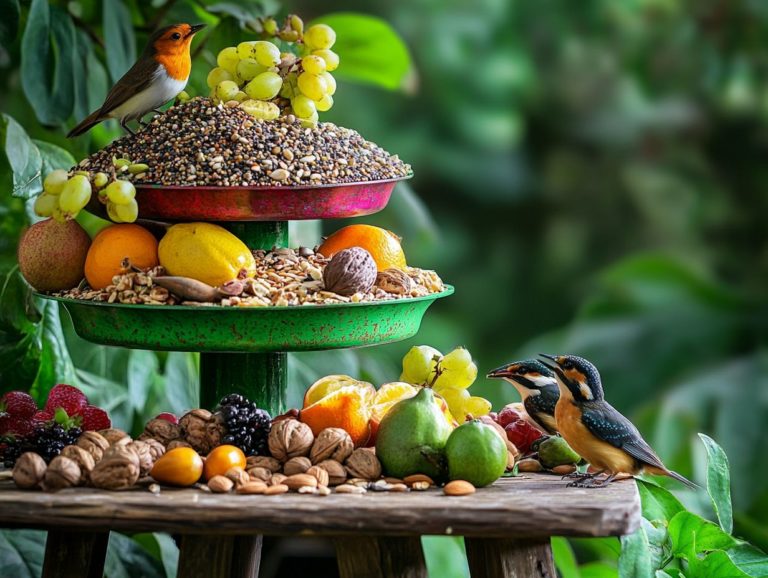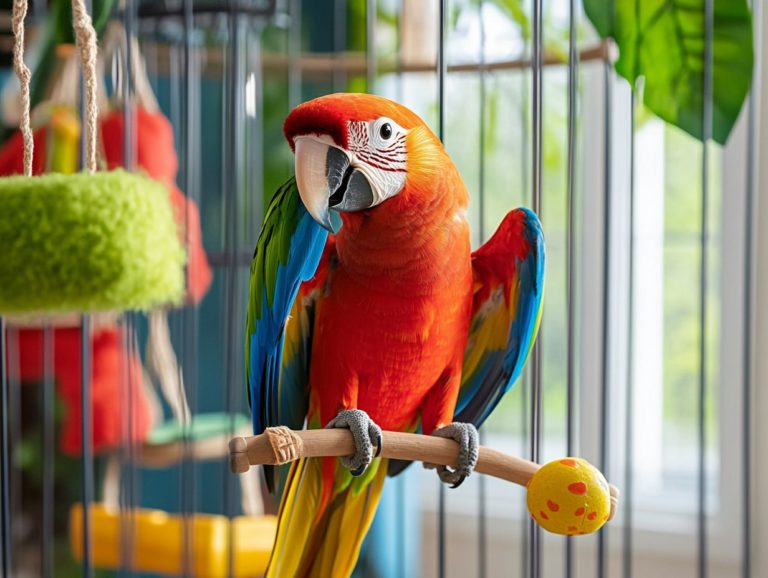Understanding the Avian Digestive System
The avian digestive system is intricate and efficient. It is vital to the health of birds and allows them to process food quickly.
This exploration delves into the fundamental anatomy and function of their digestive organs. You will also discover the diverse types of food essential for their optimal health.
Uncover the step-by-step process of digestion in birds and the common digestive challenges they encounter. Learn about the factors that influence their digestive well-being.
Discover best practices to help your feathered friends thrive with a healthy digestive system!
Contents
- Key Takeaways:
- Overview of the Avian Digestive System
- Understanding Your Birds Digestive Needs
- The Digestive Process in Birds
- Common Digestive Issues in Birds
- Factors Affecting Digestive Health in Birds
- Best Practices for Maintaining a Healthy Avian Digestive System
- Frequently Asked Questions
- What is the Avian Digestive System?
- How does the Avian Digestive System differ from other animals?
- What are the different parts of the Avian Digestive System?
- Why is the crop important in the Avian Digestive System?
- How does the gizzard aid in the digestion process?
- What are some common digestive issues in birds, and how can they be managed?
Key Takeaways:
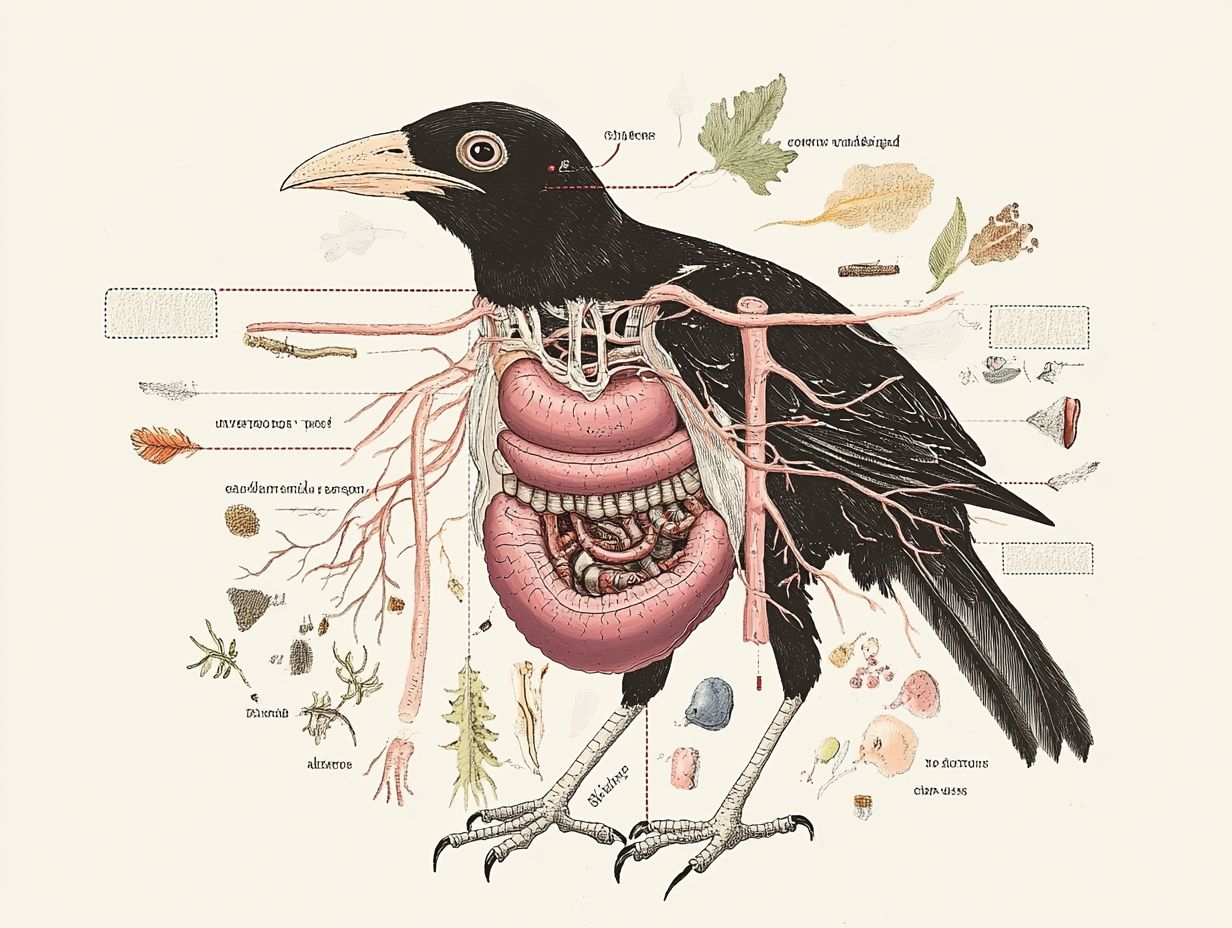
- Understanding the avian digestive system is crucial for providing proper nutrition and preventing digestive issues.
- Birds have specific dietary needs, and their digestive process differs from other animals, making a balanced diet essential.
- Maintaining a healthy digestive system in birds requires proper nutrition, good environmental conditions, and regular vet check-ups.
Overview of the Avian Digestive System
The avian digestive system allows birds to process food swiftly and absorb essential nutrients critical for survival.
Birds have developed unique adaptations in their digestive anatomy. They feature specialized organs that enhance rapid digestion and optimize the absorption of carbohydrates, fats, and proteins.
Basic Anatomy and Function
The avian digestive system has a fascinating structure. It comprises several specialized organs like the gizzard that work together to ensure efficient food processing and nutrient absorption.
It all starts with the mouth, where food enters. Next, it travels swiftly down the esophagus, connecting to the other components of digestion.
Food then enters the crop, a storage pouch where it softens before moving to the proventriculus. Here, digestive enzymes begin to break down the meal.
Next is the gizzard, a muscular organ that grinds the food, optimizing nutrient extraction. The small intestine plays a crucial role in nutrient absorption, while the cecum and colon manage waste and further nutrient absorption.
All these parts work together seamlessly, promoting optimal digestive health in birds.
Understanding Your Birds Digestive Needs
Understanding the dietary needs of birds is crucial for maintaining their health. It involves a careful balance of diverse food materials that deliver essential nutrients like carbohydrates, proteins, and fats.
By ensuring this balance, you can effectively support their well-being and vitality.
Types of Food and Nutritional Requirements
Birds thrive on a diverse diet tailored to their specific nutritional needs. This includes gallinaceous birds, such as pheasants, partridges, quail, chickens, and turkeys, which are crucial for maintaining optimal health and metabolic function.
A well-rounded menu for these avian companions typically features a mix of grains, seeds, fruits, and proteins. Grains like oats or millet provide essential carbohydrates, while seeds are rich in necessary fats and oils.
Fruits offer vital vitamins and hydration, and protein sources, such as insects or legumes, play a key role in growth and reproductive health.
It’s important to customize these dietary elements based on the species and age of the birds in your care, especially considering Salmonella risks.
For instance, young birds require more protein for their development, while older birds often benefit from high-fiber options to aid digestion. By understanding and catering to these needs, you can ensure that your feathered friends thrive.
The Digestive Process in Birds
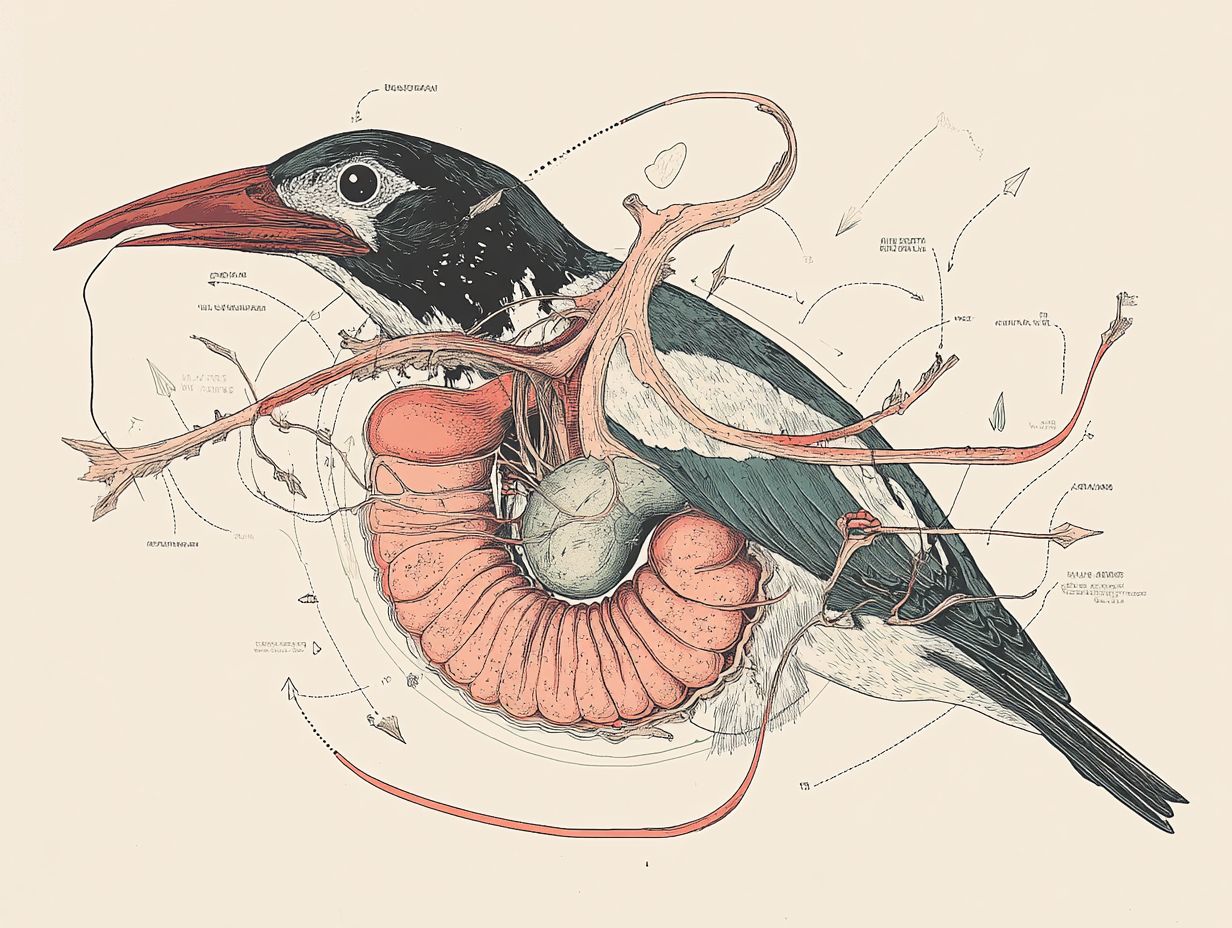
The digestive process in birds captivates the imagination with its intricate sequence of events, converting food into essential nutrients crucial for preventing diseases like inflammation of the intestines (enteritis).
This transformation unfolds through a remarkable interplay of mechanical and chemical actions, expertly managed by specialized organs including the pancreas and liver, designed for efficiency and effectiveness.
Step-by-Step Breakdown
The avian digestive process illustrates how food transforms from intake to nutrient absorption and waste elimination, ensuring a healthy intestinal tract.
This intricate system begins when you observe birds pecking at their food, which then travels down the esophagus into the crop a preliminary storage area. Here, the food is softened and prepped for further digestion.
The next phase unfolds in the proventriculus, where gastric juices rich in enzymes and hydrochloric acid initiate the chemical breakdown of proteins. After this, the gizzard a muscular organ takes over, grinding the food and mixing it with grit, further enhancing the digestive process.
As the journey continues through the small intestine, enzymes like amylase and lipase break down carbohydrates and fats, enhancing absorption. It s here that nutrients are absorbed into the bloodstream, showcasing how each organ harmonizes to ensure efficient digestion. This complex ballet ultimately delivers vital energy and nutrients while expelling indigestible waste.
Common Digestive Issues in Birds
Common digestive issues can lead to serious health challenges. Conditions like Salmonellosis, Candida, and inflammation of the intestines (enteritis) present significant risks to avian populations, especially if unrecognized and untreated.
Stay vigilant! Spotting these issues early can make all the difference in ensuring the well-being of your feathered friends.
Identifying and Treating Common Problems
Identifying and addressing common digestive issues in birds is vital for their overall health. You must observe clinical signs and act swiftly, especially in cases of Candida albicans.
As a bird owner, be vigilant, as signs of digestive distress can appear subtly. A notable change in appetite such as your bird refusing food or becoming picky can be a red flag for underlying problems, possibly indicating ulcerative conditions.
Pay attention to the consistency and color of their droppings, as abnormalities can indicate gastrointestinal upset or diseases like Salmonella.
When these symptoms arise, consider treatments such as probiotics (beneficial bacteria that support gut health) to help restore gut flora. You can also adjust their diet to include high-quality pellets alongside fresh fruits and vegetables, which are crucial for birds like chickens and turkeys.
Taking these proactive measures is crucial for effective avian health management, particularly with strategies from experts like Rob Porter, DVM, PhD.
Factors Affecting Digestive Health in Birds
Numerous factors can profoundly influence digestive health in birds, including environmental conditions, dietary selections, and comprehensive management practices implemented by their caretakers, including the prevention of Salmonellosis.
Environmental and Dietary Factors
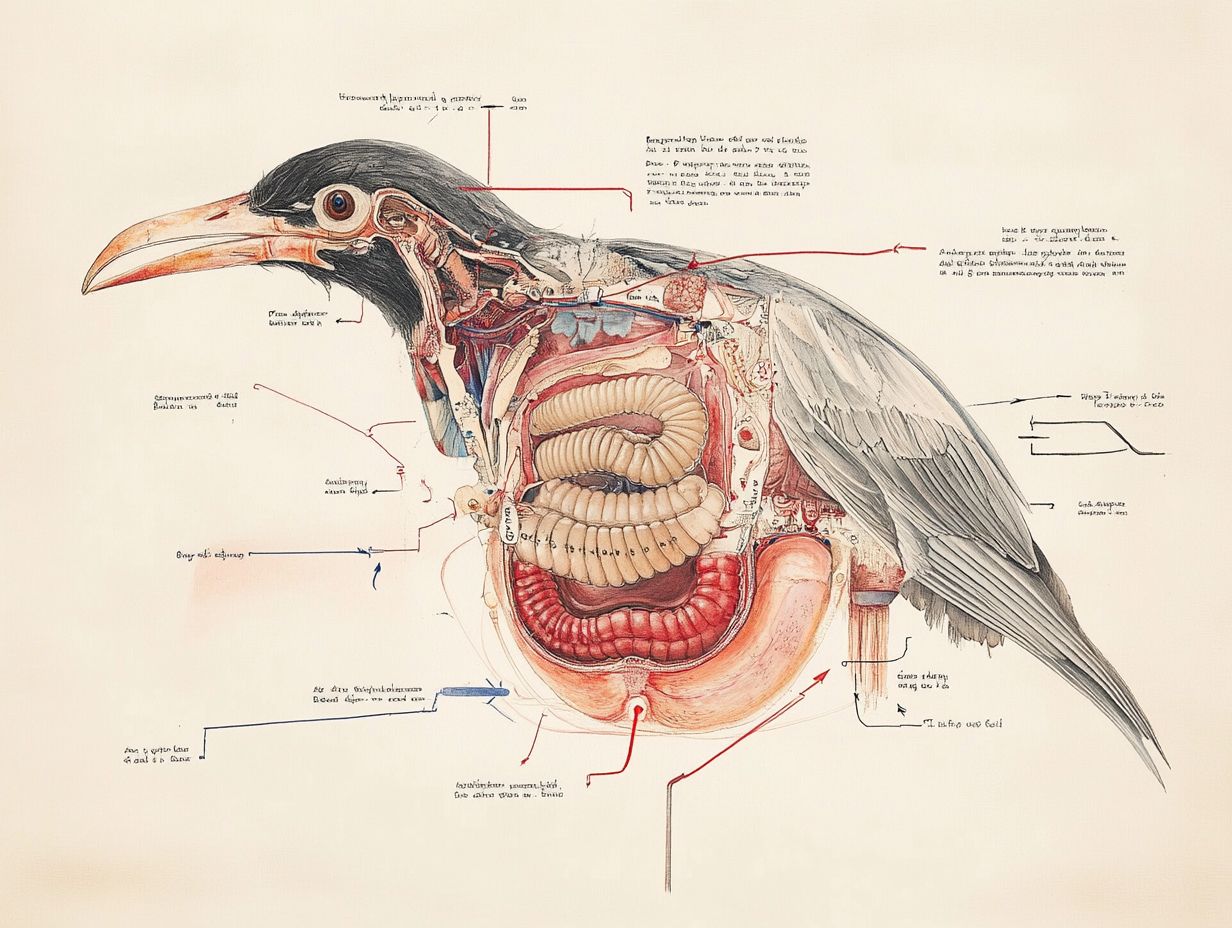
Environmental and dietary factors are crucial for maintaining the digestive health of birds. They directly influence their energy use and overall well-being, especially for birds like chickens and turkeys.
Understanding their habitats is essential. Elements such as housing conditions, ambient temperature, and stress levels can greatly affect how well they digest food. A stable and comfortable environment reduces stress, enabling birds to digest their food more effectively, which helps prevent diseases.
Your food choices matter immensely! A well-balanced mix of grains, fruits, and proteins fosters digestive health, particularly among birds like chickens and turkeys. Poor management can lead to complications.
When these factors come together seamlessly, birds thrive, showcasing vibrant plumage and high energy levels. This reinforces the importance of understanding avian digestive systems. On the other hand, unfavorable conditions can lead to digestive issues that compromise their vitality.
Best Practices for Maintaining a Healthy Avian Digestive System
Implementing best practices for a healthy avian digestive system is crucial for preventing diseases like Salmonellosis and ensuring the longevity and vitality of your birds.
Prioritizing their digestive health enhances their overall well-being and contributes to a more vibrant life filled with energy and resilience.
Here are some key practices:
- Provide a balanced diet rich in nutrients.
- Select high-quality food tailored to your bird’s species.
- Conduct regular health checks to identify issues early.
Proper Nutrition and Care Tips
Understanding proper nutrition and care tips is essential for ensuring your birds enjoy optimal digestive health. This aids in their intestinal tract efficiency, allowing them to thrive in their environments.
Choosing high-quality food rich in essential nutrients is a must. A balanced diet should include a variety of seeds, fruits, vegetables, and specialized pellets designed specifically for your bird s species, including options for birds like chickens and turkeys.
Conducting regular health assessments such as weight checks and behavioral observations enables you to spot potential issues before they escalate. By adjusting diets to improve digestive efficiency and reduce risks of intestinal inflammation, you keep your birds energetic and bolster their resilience against illnesses.
Frequently Asked Questions
What is the Avian Digestive System?
The Avian Digestive System includes the organs and processes involved in the digestion and absorption of food in birds. It plays a pivotal role in their overall health, as discussed at the MacFarlane Pheasant Symposium.
How does the Avian Digestive System differ from other animals?
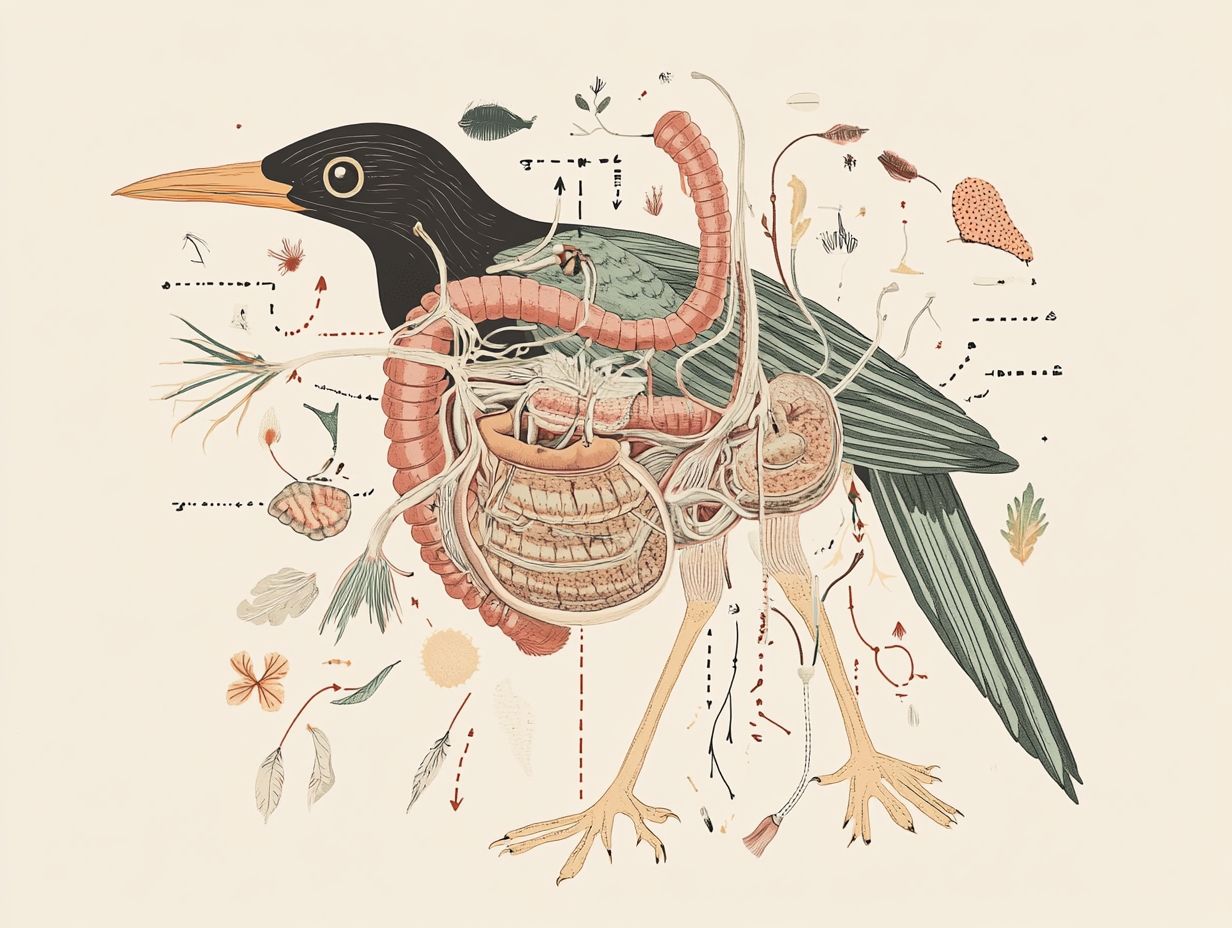
The Avian Digestive System is specialized to meet the needs of birds, which have different dietary requirements and adaptations compared to other animals.
What are the different parts of the Avian Digestive System?
The Avian Digestive System includes the beak, esophagus, crop, proventriculus, gizzard, small intestine, and large intestine.
Why is the crop important in the Avian Digestive System?
The crop is a specialized pouch in the esophagus that serves as a temporary storage area for food before it moves on to the stomach. This allows birds to quickly consume large amounts of food and digest it slowly later on.
How does the gizzard aid in the digestion process?
The gizzard is a muscular organ that helps break down food by grinding and mixing it with digestive enzymes. It also helps remove indigestible material, such as seeds and bones, from the food.
What are some common digestive issues in birds, and how can they be managed?
Common digestive issues in birds include blockage, when a bird’s digestive tract is blocked, and sour crop, a bacterial or fungal infection in the crop. Pathogens like Candida albicans and Clostridium colinum can cause these conditions.
If you think your bird has digestive problems, act quickly! Seeking veterinary care is crucial for correct care and recovery.




